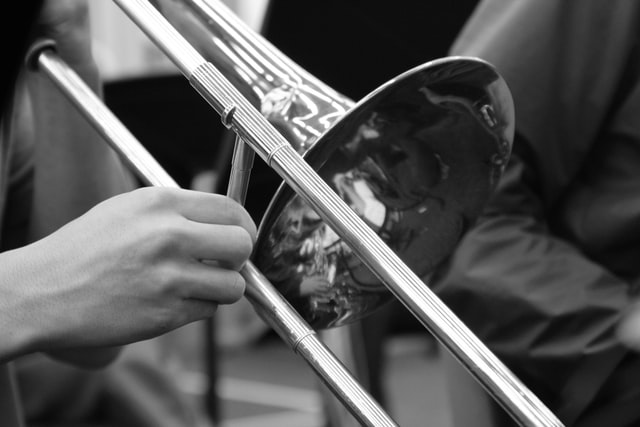Can Trombones Rust? Yes, they can. Trombones are made of metals, and metals are known to rust over time; however, due to differences in their reactivity or rate of oxidation, some metals rust more quickly than others.
Copper, zinc, nickel, silver, and a few other elements may be used alone in the construction of trombones, or they may be combined in a particular ratio with one or more additional elements.
What Causes Trombones To Rust?
Copper and zinc are the two metals that are most commonly used in the construction of trombones. Over time, when exposed to oxygen and moisture, these metals can rust and corrode. Because the natural oils and grime on your hands can also cause the finish of the instrument to get damaged, so you should always keep your hands clean before handling the instrument.
Remove Tarnish from A Trombone and Make It Look New Again
Maintenance is required for trombones, just as it is for all other types of instruments. Trombones are made of brass, which makes them prone to rust and makes them appear neglected after a short period of time.
Tarnish is one of the most damaging elements that may attack brass, but fortunately, it is simple to remove tarnish from your trombone and restore its appearance to that of a brand-new instrument.
To clean tarnish off of your trombone, you should:
- You can use an acidic brass polish that you can get at the shop, or you can use lime juice, vinegar, or even ketchup instead.
- After applying the polishing agent, wait for a few minutes to pass.
- Clean the trombone by carefully wiping it down with a moist cloth.
- If there is still some tarnish, repeat the process.
Before beginning the process of cleaning, there are a number of different approaches that may be employed, in addition to a number of considerations that need to be made.
Whether you decide to do it yourself with acids available around the house or buy a rust/tarnish remover from the store, there are a few precautions you should take and other aspects of the process that you should be aware of. All of this and more will be covered in the following section.
How to Prep Your Trombone for Polishing
Before you begin polishing your trombone, there are a few things you must do. The first thing to verify is whether or not the instrument is made of brass; if it isn’t, some chemicals in brass cleaning solutions can damage it.
After that, You will need to determine whether or not your trombone is lacquered. In order to facilitate cleaning, lacquered instruments are coated in a clear lacquer that is easy to remove. Scrub the instrument down with a clean and dry towel to check for this layer. Lacquer-finished trombones do not need to be cleaned further than a wipe-down for them to return to their former, lustrous state.
It is possible that your trombone does not have a lacquer layer to protect its shine, if the rusting lingers even after a thorough cleaning.
The first step is to prepare your instrument before polishing it. Thoroughly clean the outside of the trombone, using a wet cloth and a mild soap (Windex or equivalent window cleaner helps). In this way, the instrument is cleaned thoroughly and is ready for polishing.
Contrary to popular belief, your trombone may or may not be made of brass. In order to avoid damaging the instrument, you must perform this inspection as soon as possible. It is a waste of time and money to use brass polish if it is lacquered, so make sure it is not.
A thorough cleaning of your trombone is all you need to get started on polishing if neither of the preceding conditions are met.
How Do You Polish A Trombone To Prevent It From Rust
Once the instrument has been cleaned, it is time to polish your trombone! Choose from everyday materials like ketchup or lime, or from polishing products sold at your local hardware shop to clean your home.
A good brass polisher from the hardware store is what we suggest. Household acids, on the other hand, will work just fine if you are on a tight budget and do not mind going through an extra round of polishing.
-
Using Household Hacks to Polish a Trombone
Do not worry if you can not afford to buy a pre-packaged brass polish. One of the most popular home acids can be used in its place.
Ketchup: Ketchup is an excellent polishing agent for brass due to its high acidity.
Citrus Fruits: Tomatoes and citrus fruits both have strong acid content that acts as a polish. Make use of limes if you can, as they are the most acidic.
Vinegar: The acidity of nearly all kinds of vinegar is sufficient to accomplish the task at hand.
Pour your “product” of choice, let it settle for a few minutes, and then use a moist cloth to polish the trombone. Polish the areas with the most rust in circular motions, focusing on those areas. If the tarnishing is severe, it may require several applications of household chemicals to completely remove it.
Polishing Your Trombone with a Commercial Polishing Agent
You will likely find a variety of brass polishes on the market; choose the one that is the least intense. Do not waste your money on a high-powered polisher for trombones; they do not really need it.
Here’s how to repolish your trombone once you have obtained your polish:
- This method necessitates the use of a cleaning product and a rag.
- Make sure to follow the instructions for how long to leave the cleaning agent on and how to remove it.
- Using a clean towel, wash the instrument down after polishing to remove all of the product.
Because they are already in your possession, household products can save you money, but their reduced power means you are stuck with them. Even though store-bought cleaning supplies are more expensive, you will have to put in less effort cleaning with them. Decide for yourself what works best for your unique situation.







